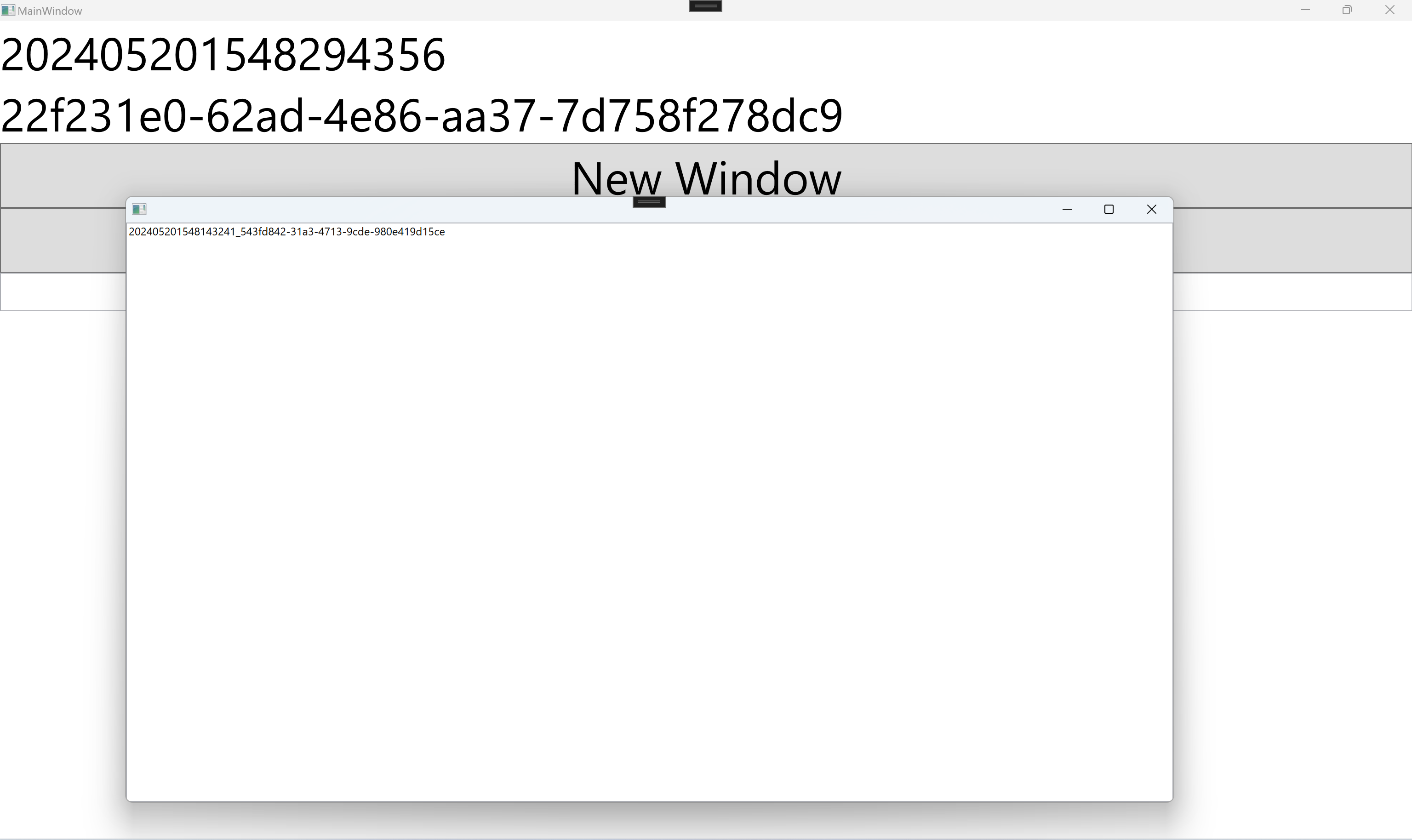WPF mvvm find element by name
Copy from https://stackoverflow.com/questions/636383/how-can-i-find-wpf-controls-by-name-or-type
//xaml <Window x:Class="WpfApp102.MainWindow" xmlns="http://schemas.microsoft.com/winfx/2006/xaml/presentation" xmlns:x="http://schemas.microsoft.com/winfx/2006/xaml" xmlns:d="http://schemas.microsoft.com/expression/blend/2008" xmlns:mc="http://schemas.openxmlformats.org/markup-compatibility/2006" xmlns:local="clr-namespace:WpfApp102" mc:Ignorable="d" WindowState="Maximized" Title="MainWindow" Height="450" Width="800"> <Window.Resources> <Style TargetType="TextBlock"> <Setter Property="FontSize" Value="50"/> </Style> </Window.Resources> <Grid> <StackPanel> <TextBlock Text="{Binding DatetimeStr,Mode=TwoWay,UpdateSourceTrigger=PropertyChanged}"/> <TextBlock Text="{Binding GuidStr,Mode=TwoWay,UpdateSourceTrigger=PropertyChanged}"/> <Button Content="New Window" Command="{Binding NewWindowCmd}" FontSize="50" /> <Button Content="Find Element" Command="{Binding FindEleCmd}" FontSize="50" /> <TextBox x:Name="tbx" FontSize="30"/> </StackPanel> </Grid> </Window>
//xaml.cs using System; using System.Collections.Generic; using System.Linq; using System.Text; using System.Threading.Tasks; using System.Windows; using System.Windows.Controls; using System.Windows.Data; using System.Windows.Documents; using System.Windows.Input; using System.Windows.Media; using System.Windows.Media.Imaging; using System.Windows.Navigation; using System.Windows.Shapes; namespace WpfApp102 { /// <summary> /// Interaction logic for MainWindow.xaml /// </summary> public partial class MainWindow : Window { public MainWindow() { InitializeComponent(); var vm=new MainVM(); this.DataContext = vm; } } }
//mvvm using System; using System.Collections.Generic; using System.ComponentModel; using System.Linq; using System.Text; using System.Threading.Tasks; using System.Windows; using System.Windows.Controls; using System.Windows.Input; namespace WpfApp102 { public class MainVM : INotifyPropertyChanged { public MainVM() { vmTimer = new System.Threading.Timer(VMTimerCallback,null,0,1000); } private void VMTimerCallback(object state) { DatetimeStr = DateTime.Now.ToString("yyyyMMddHHmmssffff"); GuidStr = Guid.NewGuid().ToString(); } public event PropertyChangedEventHandler PropertyChanged; public void OnPropertyChanged(string propName) { var handler= PropertyChanged; if(handler != null) { handler?.Invoke(this, new PropertyChangedEventArgs(propName)); } } private string datetimeStr = DateTime.Now.ToString("yyyyMMddHHmmssffff"); public string DatetimeStr { get { return datetimeStr; } set { if(value!= datetimeStr) { datetimeStr = value; OnPropertyChanged(nameof(DatetimeStr)); } } } private string guidStr=Guid.NewGuid().ToString(); public string GuidStr { get { return guidStr; } set { if(value!=guidStr) { guidStr = value; OnPropertyChanged(nameof(GuidStr)); } } } private System.Threading.Timer vmTimer { get; set; } private DelCmd findEleCmd; public DelCmd FindEleCmd { get { if(findEleCmd == null) { findEleCmd = new DelCmd(FindEleCmdExecuted); } return findEleCmd; } } private void FindEleCmdExecuted(object obj) { TextBox foundTextBox = Global.FindChild2<TextBox>(Application.Current.MainWindow, "NewWindowTbk"); if(foundTextBox != null) { foundTextBox.Text = $"{DateTime.Now.ToString("yyyyMMddHHmmssffff")}_{Guid.NewGuid().ToString()}"; } } private DelCmd newWindowCmd; public DelCmd NewWindowCmd { get { if(newWindowCmd == null) { newWindowCmd = new DelCmd(NewWindowCmdExecuted); } return newWindowCmd; } } private void NewWindowCmdExecuted(object obj) { Window win = new Window(); TextBox tb = new TextBox(); tb.Name = "NewWindowTbk"; tb.Text = "Raw Content!"; win.Content = tb; win.Show(); win.Owner = Application.Current.MainWindow; var dc = win.DataContext; TextBox foundTextBox = Global.FindChild<TextBox>(win, "NewWindowTbk"); if (foundTextBox != null) { foundTextBox.Text = $"{DateTime.Now.ToString("yyyyMMddHHmmssffff")}_{Guid.NewGuid().ToString()}"; } } } public class DelCmd : ICommand { public event EventHandler CanExecuteChanged; protected void RaiseCanExecuteChanged() { var handler = CanExecuteChanged; if (handler != null) { handler?.Invoke(this, EventArgs.Empty); } } private Action<object> _execute; private Predicate<object> _canExecute; public DelCmd(Action<object> _executeValue, Predicate<object> _canExecuteValue) { _execute = _executeValue; _canExecute = _canExecuteValue; } public DelCmd(Action<object> _executeValue) : this(_executeValue, null) { } public bool CanExecute(object parameter) { if (_canExecute == null) { return true; } return _canExecute(parameter); } public void Execute(object parameter) { _execute(parameter); } } }







【推荐】国内首个AI IDE,深度理解中文开发场景,立即下载体验Trae
【推荐】编程新体验,更懂你的AI,立即体验豆包MarsCode编程助手
【推荐】抖音旗下AI助手豆包,你的智能百科全书,全免费不限次数
【推荐】轻量又高性能的 SSH 工具 IShell:AI 加持,快人一步
· 分享一个免费、快速、无限量使用的满血 DeepSeek R1 模型,支持深度思考和联网搜索!
· 基于 Docker 搭建 FRP 内网穿透开源项目(很简单哒)
· ollama系列01:轻松3步本地部署deepseek,普通电脑可用
· 25岁的心里话
· 按钮权限的设计及实现
2022-05-20 C++ mysql mysqlclient split one big table to multiple small tables averagely